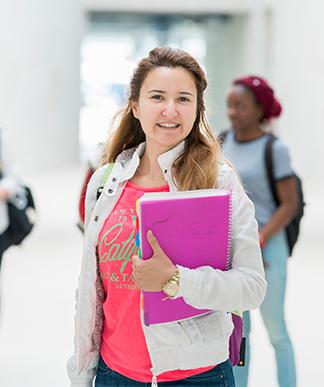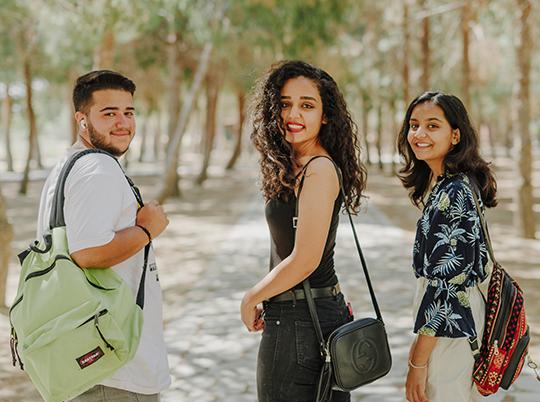


About the Department
Social work is a practice-based profession and an academic discipline that aims to make social change contribute to the development of social inclusion, empowerment and emancipation of people. Respect for social justice, human rights and diversity is at the forefront of issues that form the basis of social work. It brings individuals and systems together to improve human well-being, through an eclectic knowledge-based approach. The Department of Social Work gives its students a strong foundation by taking advantage of the interdisciplinary theoretical structure of the social sciences, such as sociology, psychology, etc. Experts from the Social Services and NGO’s, dealing with social risks, provide knowledge to the students by conferences, as well as with internship and practice opportunities, also allowing students to develop their theoretical and practical profession in depth.The main purpose of the department is to train social workers, who have an important place in society,by using both theoretical and practical methods.
Education Opportunities
Social Work Program aims to train students as experts, with the competence and knowledge, that can help in solving problems related to the social environment at the levels of individual, group and society. Social Work education provides students strong background in sociology, social research, psychology, social anthropology,etc. Internships and practices are carried out in organizations such as nursing homes, women's shelters, orphanages, local governments and Social Services Department. Interdisciplinary education, supported by practices, helps students reach the awareness of contributing to the solution of social problems by the tasks they take in the projects. When students reach to graduation stage, they learn to research, analyze social problems faced by societies, produce solutions and put them into practice. At the same time, students of Social Work Department can do double major or minor with various departments such as psychology, law while continuing their social work education.TRNC and foreign graduates can contribute to their education by continuing to Social Work master's program in English.

Career Areas
Graduates of the program can find employment opportunities in a wide range of institutions and organizations. Social workers, who are knowledgeable about the structure and problems of the society they live in, can work as planners, managers, researchers and practitioners in social services, local governments and non-governmental organizations and will contribute to the determination and planning of social policies. Graduates have the opportunity to work in nursing homes, orphanages, rehabilitation centers, ministries of Justice, Health, Labor and Social Security, in the field of industrial relations and in projects of local governments for the vulnerable populations. Similarly, those who have completed the program have employment opportunities as social workers in public institutions serving as social service institutions in the TRNC and other countries, in local governments, in institutions and organizations. Apart from these, graduates of the Department of Social Work can pursue an academic career and become a faculty member and researcher.
Contact
Faculty of Health Sciences
Çevik Uraz Center, CU206
Tel: +90 392 671 1111 Extension: 2251
Faculty E-mail: secretary-fhs@ciu.edu.tr
Head of Department: Asst. Prof. Dr. Afet Arkut
Head of Department E-mail: aarkut@ciu.edu.tr
Compulsory Courses
First Semester
MICROECONOMICS
Course code
ECON101Credit
3Theoretical
3Practical
0Ects
5READING AND WRITING SKILLS-I
Course code
ENGL141Credit
3Theoretical
2Practical
2Ects
4INTRODUCTION TO COMPUTERS
Course code
ITEC110Credit
3Theoretical
2Practical
2Ects
4PSYCHOLOGY
Course code
PSYC110Credit
3Theoretical
3Practical
0Ects
4SOCIOLOGY
Course code
SOCY101Credit
3Theoretical
3Practical
0Ects
5INTRODUCTION TO SOCIAL WORK
Course code
SOWO101Credit
2Theoretical
2Practical
0Ects
3SOCIAL WORK WORKING AREAS
Course code
SOWO103Credit
2Theoretical
2Practical
0Ects
3TURKISH LANGUAGE
Course code
TREG100Credit
0Theoretical
2Practical
0Ects
2TURKISH LANGUAGE EDUCATION-I
Course code
TURK111Credit
0Theoretical
2Practical
3Ects
2Second Semester
READING AND WRITING SKILLS-II
Course code
ENGL142Credit
3Theoretical
2Practical
2Ects
4HISTORY OF CIVILIZATION
Course code
HIST100Credit
0Theoretical
2Practical
0Ects
2INTRODUCTION TO LAW
Course code
ILAW118Credit
2Theoretical
2Practical
0Ects
4INTRODUCTION TO PHILOSOPHY
Course code
PHIL102Credit
3Theoretical
3Practical
0Ects
5SOCIAL ANTHROPOLOGY
Course code
SOCY106Credit
3Theoretical
3Practical
0Ects
4REPORT WRITING AND PRESENTATION IN SOCIAL WORK
Course code
SOWO102Credit
2Theoretical
2Practical
0Ects
3SOCIAL WORK FIELD OBSERVATIONS
Course code
SOWO104Credit
2Theoretical
2Practical
0Ects
3SOCIAL STRUCTURE AND PROBLEMS
Course code
SOWO108Credit
2Theoretical
2Practical
0Ects
3MODERN TURKISH HISTORY
Course code
TARH100Credit
0Theoretical
2Practical
0Ects
2TURKISH LANGUAGE EDUCATION-II
Course code
TURK112Credit
0Theoretical
2Practical
3Ects
2Third Semester
SOCIAL WORK REGULATIONS
Course code
SOWO201Credit
2Theoretical
2Practical
0Ects
4HUMAN BEHAVIOUR AND SOCIAL ENVIRONMENT-I
Course code
SOWO203Credit
4Theoretical
4Practical
0Ects
7SOCIAL WORK RESEARCH-I
Course code
SOWO205Credit
2Theoretical
2Practical
0Ects
4RECORD KEEPING AND REPORTING IN SOCIAL WORK
Course code
SOWO207Credit
2Theoretical
2Practical
0Ects
5STATISTICS
Course code
STAT203Credit
3Theoretical
3Practical
0Ects
4TURKISH LANGUAGE EDUCATION-II
Course code
TURK211Credit
0Theoretical
2Practical
3Ects
2UNIVERSITY ELECTIVE
Course code
UNIEXX1Credit
3Theoretical
3Practical
0Ects
4Fourth Semester
SOCIAL WORK THEORY-I: INDIVIDUALS
Course code
SOWO202Credit
4Theoretical
4Practical
0Ects
6HUMAN BEHAVIOUR AND SOCIAL ENVIRONMENT-II
Course code
SOWO204Credit
4Theoretical
4Practical
0Ects
6SOCIAL WORK RESEARCH-II
Course code
SOWO206Credit
2Theoretical
2Practical
0Ects
5INTERVIEW TECHNIQUES IN SOCIAL WORK
Course code
SOWO208Credit
2Theoretical
2Practical
0Ects
3DISABILITY AND SOCIAL WORK
Course code
SOWO210Credit
2Theoretical
2Practical
0Ects
4TURKISH LANGUAGE EDUCATION-IV
Course code
TURK212Credit
0Theoretical
2Practical
3Ects
2UNIVERSITY ELECTIVE
Course code
UNIEXX2Credit
3Theoretical
3Practical
0Ects
4Fifth Semester
SOCIAL WORK THEORY-II: FAMILIES AND GROUPS
Course code
SOWO301Credit
4Theoretical
4Practical
0Ects
8SOCIAL WORK MANAGEMENT
Course code
SOWO303Credit
3Theoretical
3Practical
0Ects
7GERIATRIC SOCIAL WORK
Course code
SOWO317Credit
2Theoretical
2Practical
0Ects
7AREA ELECTIVE
Course code
SOWOXX1Credit
3Theoretical
3Practical
0Ects
4AREA ELECTIVE
Course code
SOWOXX2Credit
3Theoretical
3Practical
0Ects
4Sixth Semester
SOCIAL POLICY
Course code
SOWO302Credit
3Theoretical
3Practical
0Ects
6ETHICAL PRINCIPLES IN SOCIAL WORK
Course code
SOWO304Credit
2Theoretical
2Practical
0Ects
5LOCAL AUTHORITIES AND SOCIAL WORK
Course code
SOWO306Credit
3Theoretical
3Practical
0Ects
7SOCIAL WORK THEORY-III: ORGANIZATIONS AND COMMUNITY
Course code
SOWO308Credit
4Theoretical
4Practical
0Ects
8AREA ELECTIVE
Course code
SOWOXX3Credit
3Theoretical
3Practical
0Ects
4Seventh Semester
SUMMER TRAINING
Course code
SOWO400Credit
0Theoretical
0Practical
0Ects
6PROJECT-I
Course code
SOWO401Credit
3Theoretical
1Practical
4Ects
8MEDICAL AND PSYCHIATRIC SOCIAL WORK
Course code
SOWO403Credit
3Theoretical
3Practical
0Ects
4CRIMINALITY AND SOCIAL WORK
Course code
SOWO405Credit
3Theoretical
3Practical
0Ects
4AREA ELECTIVE
Course code
SOWOXX4Credit
3Theoretical
3Practical
0Ects
4AREA ELECTIVE
Course code
SOWOXX5Credit
3Theoretical
3Practical
0Ects
4Eighth Semester
SOCIAL WORK PRACTICE
Course code
SOWO402Credit
10Theoretical
0Practical
20Ects
16PROJECT-II
Course code
SOWO404Credit
3Theoretical
1Practical
4Ects
10AREA ELECTIVE
Course code
SOWOXX6Credit
3Theoretical
3Practical
0Ects
4Elective Courses
GENDER EQUALITY
Course code
SOWO327Credit
3Theoretical
3Practical
0Ects
5SCHOOL SOCIAL WORK
Course code
SOWO423Credit
3Theoretical
3Practical
0Ects
0Human Rights and Social Work
Course code
SOWO325Credit
3Theoretical
3Practical
0Ects
4Social Work in Disasters
Course code
SOWO329Credit
3Theoretical
3Practical
0Ects
4TR Applicants
TR Students who are successful in the exams conducted by the Higher Education Council Student Selection and Placement Center (ÖSYM) and are entitled to enroll in our university in line with their preferences can complete the registration process with the necessary documents for registration from our Registration and Liaison Offices throughout Turkey or from the Marketing Directorate on campus.
Click for detailed admission requirements information.
TRNC Applicants
TRNC citizens and TR citizen candidate students who have completed their entire high school education in TRNC. They are placed in undergraduate programs in line with their success in the CIU Student Placement and Scholarship Ranking Exam and the programs they prefer.
Students who are successful in the exam can register from the TRNC Marketing Office.
Applicants can directly apply online to our undergraduate programs using the application portal. Please fill in your details correctly and upload all the required documents listed on the last page of the application form.
Required documents;
- Completed application form,
- Higher/Secondary Certificate or equivalents (e.g. O/A’Level, WAEC/NECO),
- Evidence of English Language competence: TOEFL (65 IBT) or IELTS (5.5). Students without these documents will take the CIU English proficiency exam on campus following arrival,
- Scanned copy of international passport/birth certificate,
- Fully completed and signed CIU Rules and Regulations document (which can be downloaded during the online application).
Cyprus International University provides academic scholarships for its students as an incentive for success, with most students benefiting from 50%, 75% or 100% scholarships or discounted tuition fees. Click for more information.
Tuition Fees are determined at the beginning of each academic year. Candidate students who are entitled to enroll in CIU can learn their fees in line with the Tuition Fee Calculation system.